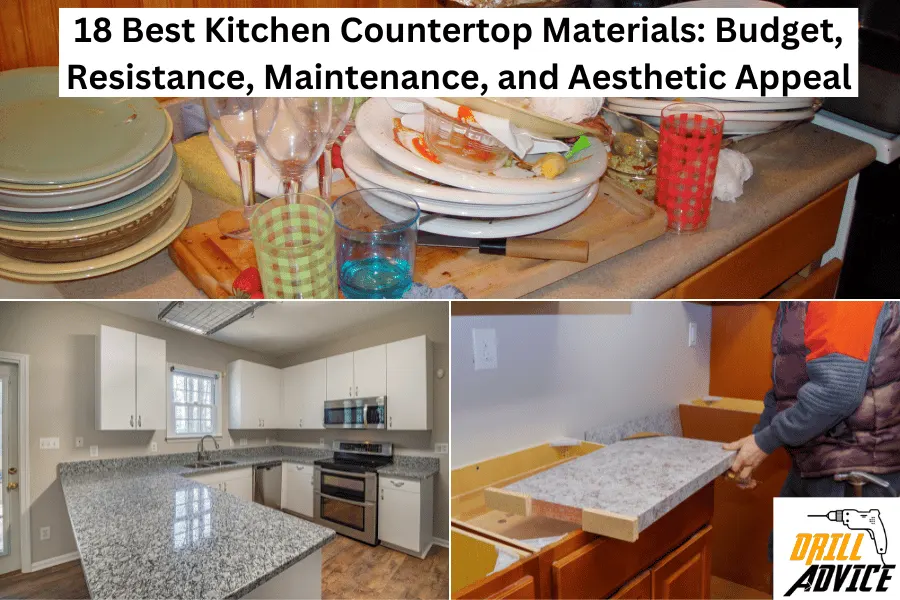
The kitchen countertop is a flat and horizontal surface in the kitchen which is used to keep the pots, plates and appliances for the kitchen activities. The kitchen countertop is built with using various materials in order to have a good aesthetic view and a wide range of usage.
The 18 best kitchen countertop materials are granite, marble, limestone, slate, onyx, quartz, stainless steel, tiles, porcelain tiles, wood, plywood, decorative laminate, paper composite, resin, concrete, cement, soapstone and glass countertop.
Before choosing these materials, you should consider facts such as budget, resistance, maintenance, and aesthetic appeal of the material.
When you select a kitchen countertop material, it should be in your budget. The countertop material price depends on the material quality and thickness. If you are looking for higher-quality material for the kitchen countertop, you should have a higher budget. Higher-quality materials are always high quality.
The kitchen countertop should be water-resistant, heat-resistant, stain-resistant and scratch-resistant. The kitchen countertop is always getting wet from the water due to kitchen activities. Therefore, countertop material should be water resistant and not swell ot damp by the water. The kitchen countertop is used to keep the hot pots and plates. Hence it should be heat resistant. Due to some liquids and foods stains can remain in the surface. Therefore kitchen countertop surface should be stain-resistant. Due to life, appliance countertop surfaces can be scratched easily. Hence it should be scratch-resistant.
When you choose a kitchen countertop, you should choose the minimum maintenance and cleaning material. The kitchen countertop is dirty with the food and liquids in every cooking activity and it should be cleaned with using minimum water and dry in minimum time period. It will improve the health and minimize hygiene, pests and odors.
Kitchen countertop material should have an aesthetic appeal. It should match the kitchen design, colour and user preferences
What are the 18 Best Kitchen Countertop Materials?
1. Granite Countertop
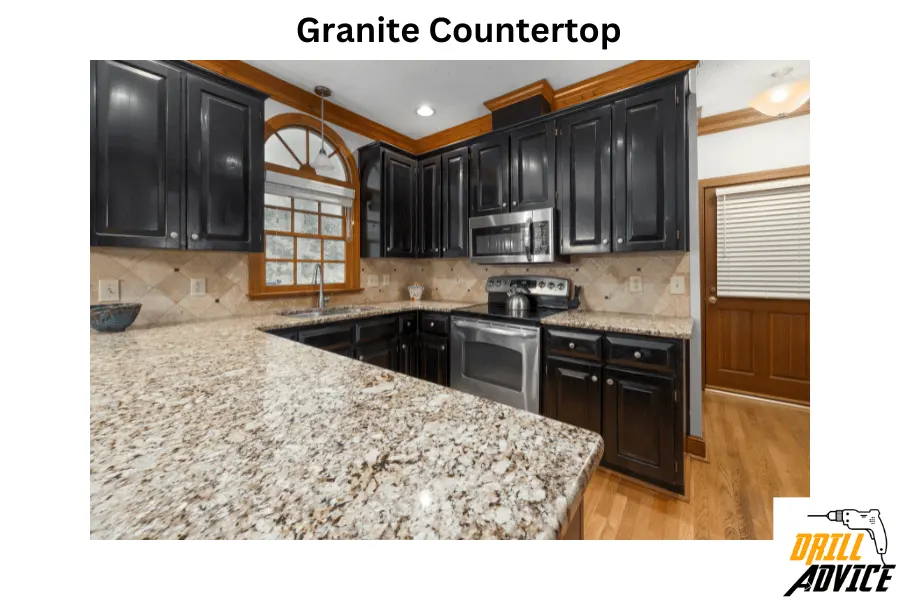
- Budget: Granite countertops can range in price, but they are generally more affordable compared to other types of materials such as quartz or solid surface.
- Water Resistance: Granite is naturally resistant to water, making it a suitable choice for kitchen countertops. However, it is still advisable to seal the surface periodically to improve its water resistance.
- Heat Resistance: Granite is highly heat resistant, which means you can place hot pots and pans directly on the surface without worrying about any damage.
- Scratch Resistance: Granite is a durable material that is resistant to scratches. However, it is still recommended to use cutting boards and avoid dragging heavy objects across the surface to prevent any potential scratches in the kitchen.
- Maintenance, Cleaning, and Repair: Granite countertops require regular sealing to maintain their beauty and water resistance. Cleaning is easy with a mild soap and water solution, avoiding abrasive cleaners. In the event of any damage, professional repair services can easily fix minor issues.
- Aesthetic View: Granite offers a natural and elegant look to your kitchen. With its unique patterns and colors, it adds a touch of sophistication and luxury to any space.
Read More About – 10 Best Kitchen Cabinet Materials: Woods, Metals, Glass, Plastic and Vinyl
2. Marble Countertop
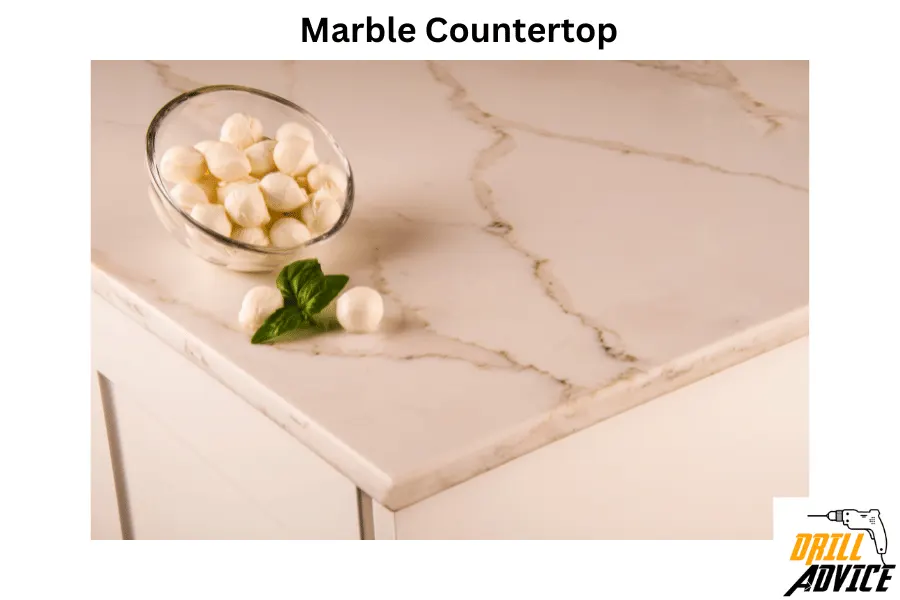
- Budget: Marble countertops generally tend to be more expensive compared to granite or other materials. It is important to consider your budget before opting for marble.
- Water Resistance: While marble is not as naturally water-resistant as granite, it can still withstand water to a certain extent. However, it is recommended to seal the surface more frequently to prevent any water damage.
- Heat Resistance: Marble is heat resistant, but it is susceptible to heat damage if exposed to high temperatures for prolonged periods. It is advisable to use trivets or hot pads to protect the countertop surface.
- Scratch Resistance: Marble is a softer and more porous material compared to granite, making it more prone to scratches. It is crucial to use cutting boards and avoid dragging heavy objects to prevent any potential damage.
- Maintenance, Cleaning, and Repair: Marble countertops require regular sealing and more delicate cleaning compared to granite. Acidic substances such as citrus juices or vinegar should be avoided as they can etch the surface. In case of any damage, professional repair services are recommended.
- Aesthetic View: Marble countertops have smooth and luxurious appearance, it add a touch of sophistication to any kitchen.
3. Limestone Countertop
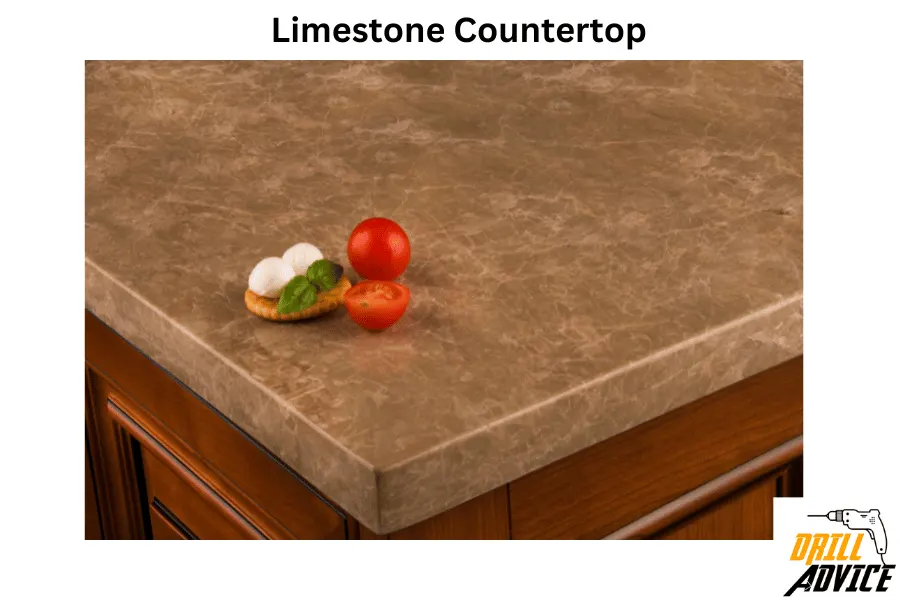
- Budget: Limestone countertops can vary in price, but they generally fall within a mid-range budget, making them a more affordable option compared to high-end materials like granite or marble.
- Water Resistance: Limestone is a porous material, which means it is not as naturally resistant to water as granite or marble. It is important to seal the countertop surface regularly to enhance its water resistance and prevent any potential water damage or staining.
- Heat Resistance: Limestone is heat resistant to a certain degree, but it is recommended to use trivets or hot pads to protect the countertop surface from direct heat exposure. Placing hot pots or pans directly on limestone countertops can cause thermal shock and potentially lead to cracks or damage.
- Scratch Resistance: Limestone is a softer material compared to granite or marble, which makes it more prone to scratches. It is advisable to use cutting boards and avoid dragging sharp objects across the countertop surface to prevent any potential scratches or damage.
- Maintenance, Cleaning, and Repair: Limestone countertops require regular sealing to maintain their durability and water resistance. Cleaning should be done with a mild soap and water solution, avoiding abrasive cleaners that can damage the surface. In case of any damage or stains, professional repair services may be needed to restore the countertop’s appearance.
- Aesthetic View: Limestone countertops offer a unique and natural look to your kitchen. With its soft, earthy tones and subtle veining, limestone adds warmth and character to any space. It is a popular choice for homeowners looking for a more rustic or traditional aesthetic.
4. Slate Countertop
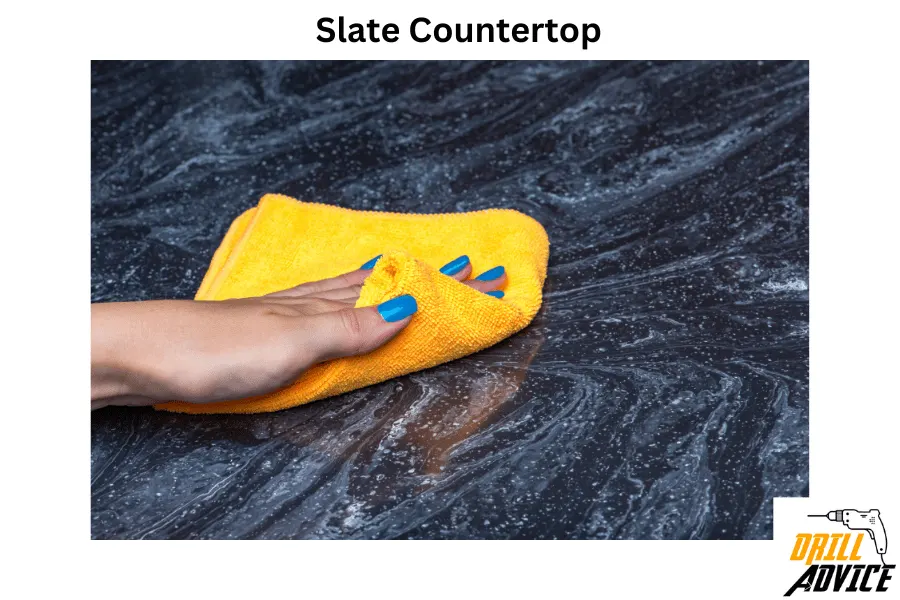
- Budget: Slate countertops are typically priced in the mid-range to higher end of the spectrum. While they may not be as affordable as some other materials, they offer excellent durability and aesthetic appeal.
- Water Resistance: Slate is naturally water-resistant, making it a suitable choice for kitchen countertops. Its dense composition helps to prevent water absorption and potential damage caused by moisture. However, it is still recommended to seal the surface periodically to maintain its water resistance and protect against stains.
- Heat Resistance: Slate is highly heat resistant, which means you can place hot pots and pans directly on the countertop surface without worrying about causing damage. This makes it an excellent choice for busy kitchens.
- Scratch Resistance: Slate is a durable material that is resistant to scratches. However, it is still advisable to use cutting boards and avoid dragging sharp objects across the surface to prevent any potential scratches or damage. While it is more scratch-resistant than materials like marble, it’s always best to exercise caution to maintain its appearance.
- Maintenance, Cleaning, and Repair: Slate countertops are relatively low-maintenance. They do not require frequent sealing like some other natural stone materials. Cleaning can be done with a mild soap and water solution, and abrasive cleaners should be avoided to prevent scratching. In the event of any damage, professional repair services can usually address minor issues and restore the countertop’s appearance.
- Aesthetic View: Slate countertops offer a unique and natural look to your kitchen. With its rich and varied color options, ranging from deep charcoal to earthy greens and blues, slate adds a touch of elegance and sophistication to any space. It provides a sleek and contemporary aesthetic that complements a variety of kitchen styles.
5. Onyx Countertop
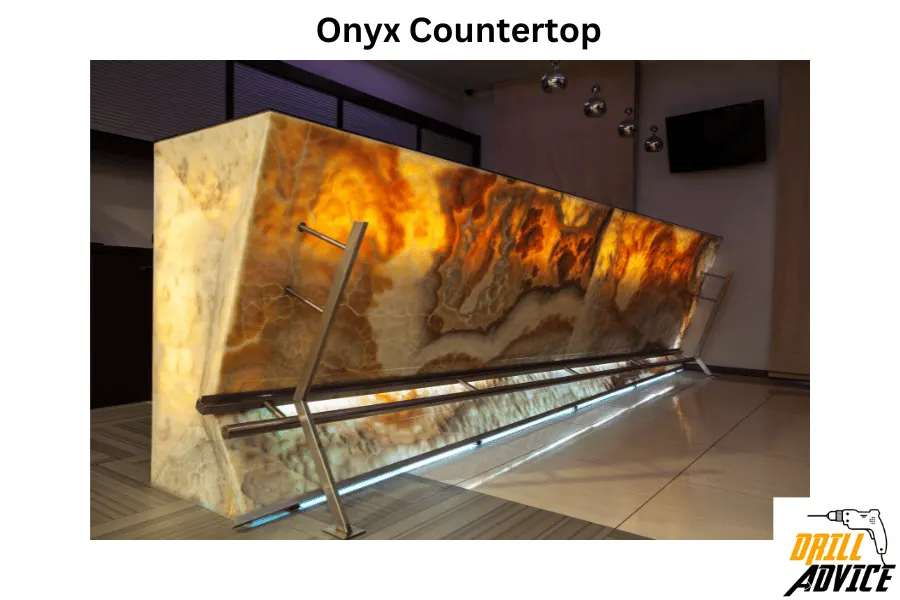
- Budget: Onyx countertops are generally considered a higher-end option and can be more expensive compared to other materials such as granite or quartz. It is important to factor in your budget when considering onyx for your kitchen.
- Water Resistance: Onyx is a porous material, which means it is not naturally as water-resistant as some other countertop materials. It is important to seal the surface regularly to enhance its water resistance and prevent any potential water damage or staining.
- Heat Resistance: Onyx is a heat-resistant material, but it is not as heat-resistant as materials like granite or quartz. It is recommended to use trivets or hot pads to protect the surface from direct heat exposure and avoid placing hot pots or pans directly on the onyx countertop.
- Scratch Resistance: Onyx is a softer and more delicate material compared to granite or quartz, making it more prone to scratches and etching. It is crucial to use cutting boards and avoid dragging sharp objects across the surface to prevent any potential damage or scratching.
- Maintenance, Cleaning, and Repair: Onyx countertops require regular sealing to maintain their durability and water resistance. Cleaning should be done with a mild soap and water solution, avoiding abrasive cleaners that can damage the surface. It is important to handle onyx with care to prevent any chips or cracks, and professional repair services may be needed.
- Aesthetic View: Onyx countertops offer a stunning and luxurious look to your kitchen. With its translucent properties and unique veining patterns, onyx creates a beautiful focal point and brings a touch of elegance to any space. It is particularly prized for its ability to transmit light, allowing for stunning backlighting effects.
6. Quartz Countertop
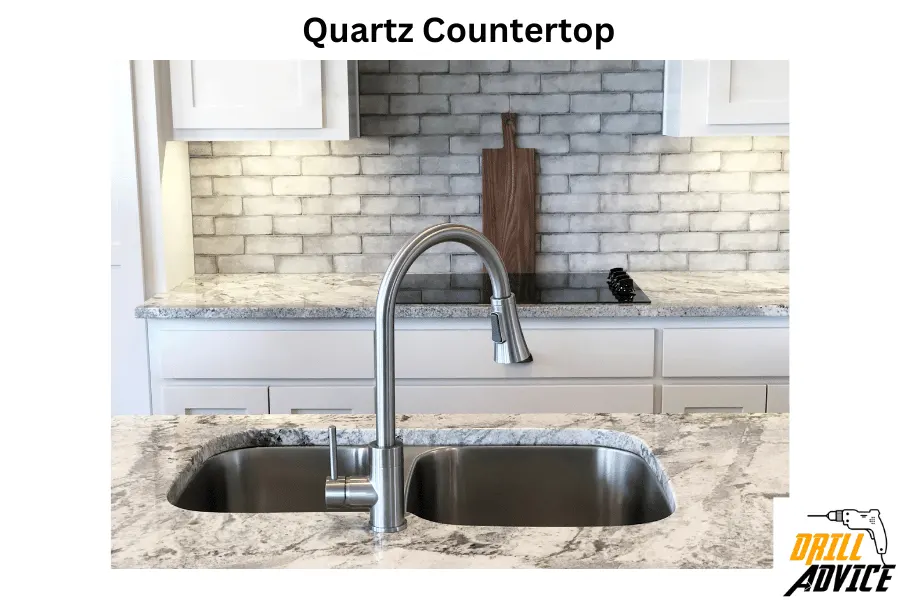
- Budget: Quartz countertops generally fall within the mid to higher range in terms of cost. While they may be more expensive than materials like laminate or tile, they offer excellent durability and a wide range of design options.
- Water Resistance: Quartz is a non-porous material, which means it is highly resistant to water and moisture. This makes it an ideal choice for kitchens where spills and splashes are common. Quartz countertops do not require sealing and are naturally resistant to staining.
- Heat Resistance: Quartz is heat resistant, but it is important to use trivets or hot pads to protect the surface from direct heat exposure. While quartz can withstand moderate heat, prolonged exposure to high temperatures can cause damage such as discolouration or cracking.
- Scratch Resistance: Quartz is known for its exceptional durability and scratch resistance. It is highly resistant to scratches and chips, making it an excellent choice for busy kitchens. However, it is still advisable to use cutting boards and avoid dragging sharp objects across the surface to maintain its pristine condition.
- Maintenance, Cleaning, and Repair: Quartz countertops are relatively low-maintenance. They do not require sealing or special maintenance. Cleaning can be done with mild soap and water or a non-abrasive cleaner. In the event of any damage, professional repair services can address minor issues and restore the countertop’s appearance.
- Aesthetic View: Quartz countertops offer a wide range of design options, with various colors, patterns, and finishes available. Whether you prefer a classic, contemporary, or natural look, there is a quartz option to suit your style. Quartz provides a sleek and uniform appearance, and the engineered nature of the material allows for consistent patterns and colors throughout the slab.
7. Stainless Steel Countertop
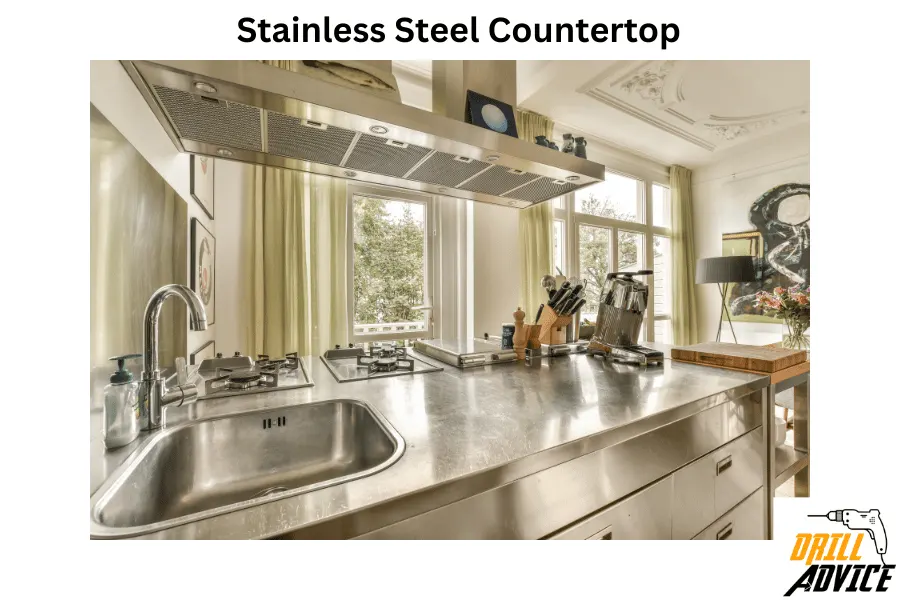
- Budget: Stainless steel countertops can vary in price, but they are generally considered a mid to higher-end option. While stainless steel countertops may be more expensive than materials like laminate or tile, they offer excellent durability and a sleek, modern look.
- Water Resistance: Stainless steel is naturally resistant to water, making it a suitable choice for kitchens. It is non-porous and does not absorb moisture, which helps prevent water damage or staining. However, it is important to wipe off any standing water or moisture promptly to avoid potential water spots.
- Heat Resistance: Stainless steel is highly heat resistant, making it an ideal choice for kitchen countertops. It can withstand high temperatures without warping or discoloration. This means you can place hot pots and pans directly on the surface without worrying about causing any damage.
- Scratch Resistance: Stainless steel is known for its durability and scratch resistance. While it is not completely scratch-proof, it can withstand normal kitchen use without significant damage. However, it is still advisable to use cutting boards and avoid dragging sharp or abrasive objects across the surface to minimize the risk of scratches.
- Maintenance, Cleaning, and Repair: Stainless steel countertops are relatively low-maintenance. They are easy to clean with a mild soap and water solution or a stainless steel cleaner. Avoid using abrasive cleaners or steel wool, as they can scratch the surface. In terms of repair, stainless steel is durable and can be easily repaired by a professional if needed.
- Aesthetic View: Stainless steel countertops offer a sleek and modern look to your kitchen. They are highly versatile and can complement a variety of kitchen styles, from contemporary to industrial. Stainless steel provides a clean and professional appearance, and its reflective surface can help brighten up the space.
8. Tile Countertop
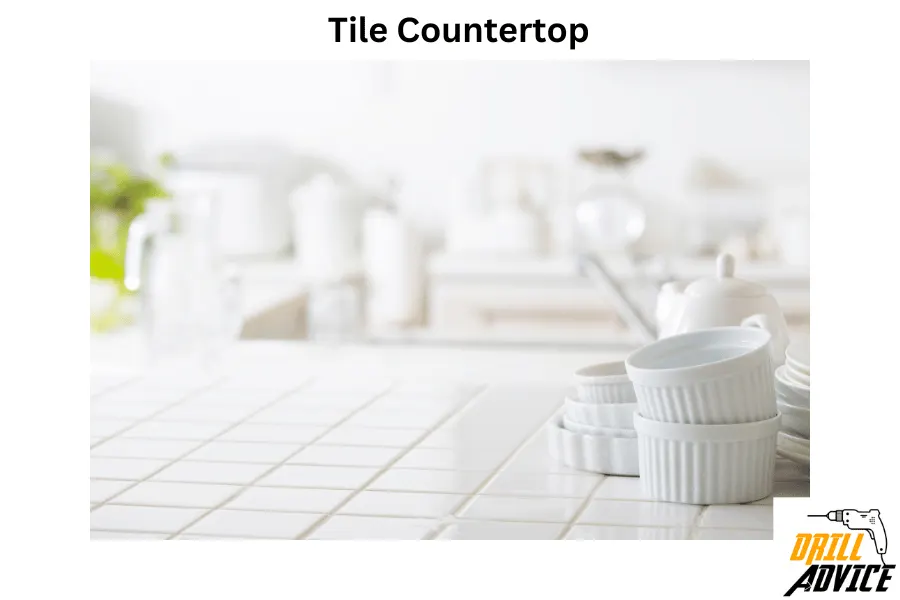
- Budget: Tile countertops can vary in price depending on the type of tile chosen. They are generally considered a more affordable option compared to materials like granite or quartz. However, keep in mind that additional costs may be incurred for installation and sealing.
- Water Resistance: Tile countertops, especially ceramic or porcelain tiles, are naturally water-resistant. They do not absorb moisture, making them suitable for kitchen use. However, it is important to properly seal the grout lines between the tiles to prevent any water penetration or staining.
- Heat Resistance: Most tile materials, such as ceramic or porcelain, are heat resistant to a certain degree. They can withstand normal kitchen temperatures without being damaged. However, it is still recommended to use trivets or hot pads to protect the countertop surface from direct heat exposure to avoid potential damage.
- Scratch Resistance: Tile countertops, especially those made from harder materials like porcelain or natural stone, are generally scratch-resistant. However, it is advisable to use cutting boards and avoid dragging sharp objects across the surface to prevent any potential scratching or damage to the tile.
- Maintenance, Cleaning, and Repair: Tile countertops require regular maintenance and cleaning to keep them in good condition. Grout lines should be sealed periodically to prevent staining and water penetration. Cleaning can be done with a mild cleanser and a non-abrasive sponge or cloth. In terms of repair, individual tiles can be replaced if they become damaged or cracked.
- Aesthetic View: Tile countertops offer a wide range of design options, colors, patterns, and textures. From classic subway tiles to intricate mosaic patterns, there is a tile option to suit any kitchen style. Tile offers versatility and allows for creativity in achieving the desired aesthetic for your kitchen.
9. Porcelain Tile Countertop
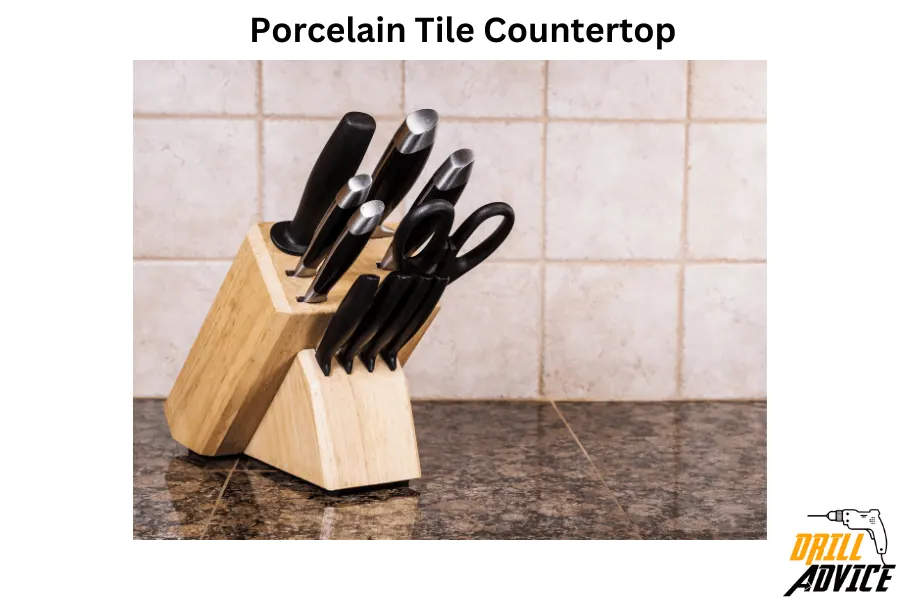
- Budget: Porcelain tile countertops can vary in price, but they are generally considered a mid to higher-end option compared to other types of tile. While they may be more expensive than ceramic or natural stone tiles, they offer excellent durability and a wide range of design options.
- Water Resistance: Porcelain tile is naturally water-resistant, making it an excellent choice for kitchen countertops. It is non-porous and does not absorb moisture, which helps prevent water damage or staining.
- Heat Resistance: Porcelain tile is highly heat resistant, allowing you to place hot pots and pans directly on the surface without worrying about damage. It can withstand high temperatures without warping or discoloration. However, it is still recommended to use trivets or hot pads to protect the surface and prolong its lifespan.
- Scratch Resistance: Porcelain tile is known for its exceptional durability and scratch resistance. It is highly resistant to scratches, making it an excellent choice for busy kitchen countertops. However, it is still advisable to use cutting boards and avoid dragging sharp or abrasive objects across the surface.
- Maintenance, Cleaning, and Repair: Porcelain tile countertops are relatively low-maintenance. They are easy to clean with a mild soap and water solution or a non-abrasive cleaner. Grout lines should be properly sealed and cleaned to prevent staining and maintain a fresh appearance. In the event of any damage, individual tiles can be replaced if needed.
- Aesthetic View: Porcelain tile offers a wide range of design options, colors, patterns, and textures. From mimicking the look of natural stone to contemporary and modern designs, porcelain tile can achieve various aesthetics in your kitchen. It is a versatile material that can complement a variety of styles and provide a sleek and polished appearance.
10. Wood Countertop
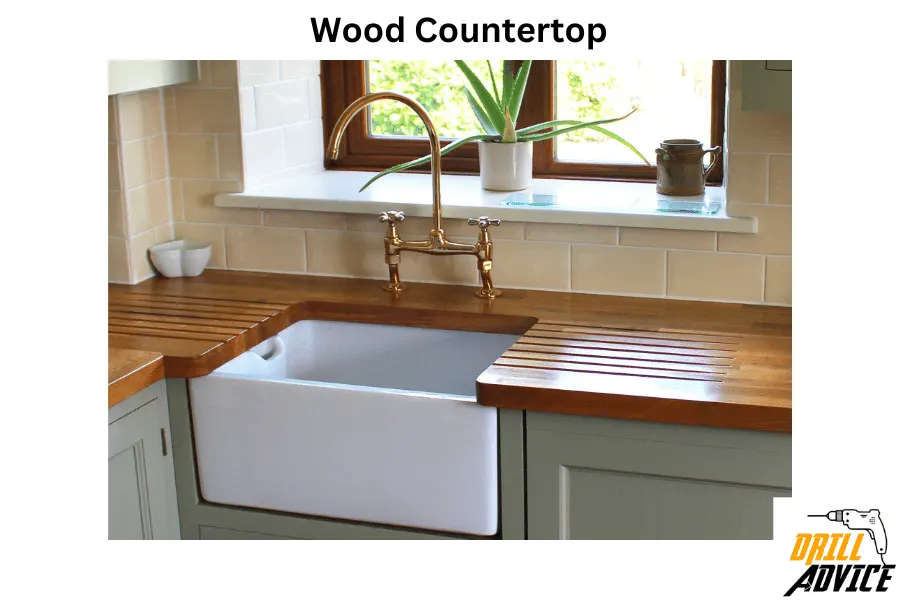
- Budget: Wood countertops can vary in price depending on the type of wood. Price can vary from affordable options like bamboo to higher-end hardwoods. It’s important to consider your budget and the cost of maintenance and sealing for wood countertops.
- Water Resistance: Wood is a naturally porous material, which means it is not inherently water-resistant. However, with proper maintenance and sealing, wood countertops can be made more water-resistant. Regular sealing helps to protect the wood and prevent water damage.
- Heat Resistance: Wood countertops can handle moderate heat, but they are not as heat-resistant as materials like granite or stainless steel. It is important to use trivets or hot pads to protect the wood surface from direct heat exposure, as prolonged exposure to high temperatures can cause damage, such as discoloration or warping.
- Scratch Resistance: Wood countertops are susceptible to scratches and dents, as wood is a softer material. It’s important to use cutting boards and avoid dragging sharp or heavy objects across the surface to prevent damage. Regular maintenance, such as sanding and refinishing, can help minimize the appearance of scratches.
- Maintenance, Cleaning, and Repair: Wood countertops require regular maintenance to keep them in good condition. This includes periodic sealing to protect the wood and regular cleaning with mild soap and water. Avoid using harsh chemicals or abrasive cleaners that can damage the wood. In the event of any damage, such as scratches or stains, sanding and refinishing may be necessary.
- Aesthetic View: Wood countertops offer a warm and natural look to your kitchen. They provide a timeless and inviting aesthetic that can complement a variety of kitchen styles, from rustic to modern. Wood offers a unique grain pattern and can develop a beautiful patina over time.
11. Plywood Countertop
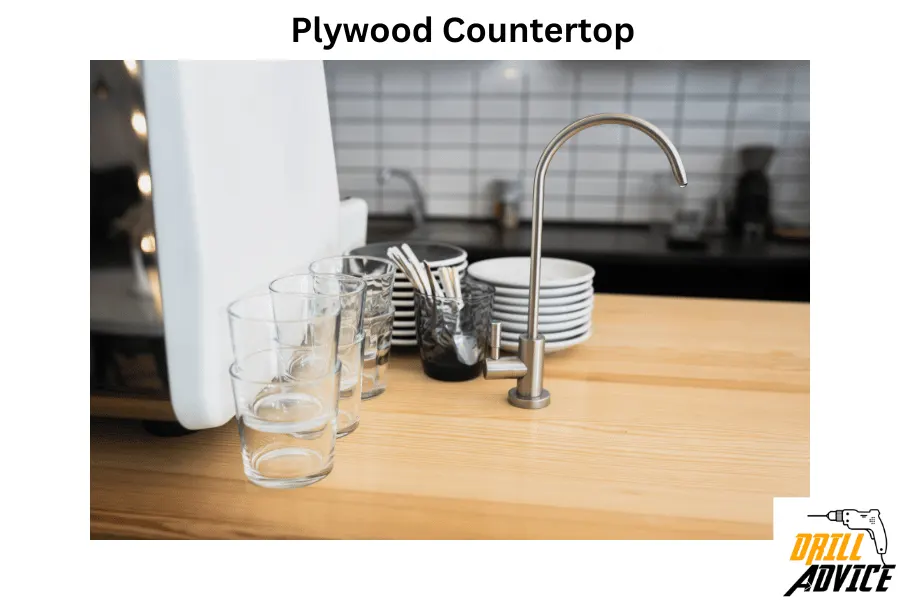
- Budget: Plywood countertops are generally considered a more affordable option compared to other countertop materials. They are often chosen for their cost-effectiveness, making them a budget-friendly choice for homeowners.
- Water Resistance: Plywood is not naturally water-resistant. However, it can be made water-resistant by applying a protective finish or coating. It is crucial to properly seal and maintain the plywood surface to prevent water damage, swelling, or warping. Regular sealing and prompt cleaning of spills are necessary to maintain its water resistance.
- Heat Resistance: Plywood is not inherently heat-resistant. It can be susceptible to damage from direct heat exposure, such as scorching or warping. It is important to use trivets or hot pads to protect the surface from hot pots and pans to prevent any potential damage.
- Scratch Resistance: Plywood is not as scratch-resistant as harder materials like granite or quartz. It can be susceptible to scratches and dents, especially with heavy use. It is advisable to use cutting boards and avoid dragging sharp objects across the surface to minimize the risk of scratches or damage.
- Maintenance, Cleaning, and Repair: Plywood countertops require regular maintenance to ensure their longevity. This includes applying a protective finish or coating periodically and cleaning with mild soap and water. It is important to avoid using harsh chemicals or abrasive cleaners that can damage the plywood. In the event of any damage, repairs can be made by sanding and refinishing the affected area.
- Aesthetic View: Plywood countertops offer a rustic and natural look to your kitchen. They provide a warm and inviting aesthetic that can complement a variety of styles, especially in more casual or eclectic kitchens. Plywood can be stained or painted to suit your desired aesthetic.
12. Decorative Laminate Countertop
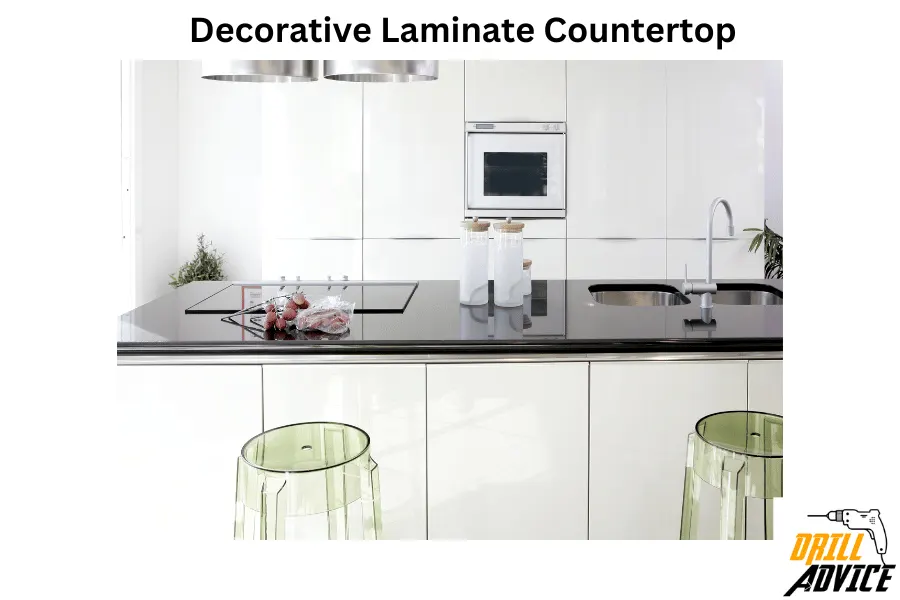
- Budget: Decorative laminate countertops are a cost-effective option. They are often more affordable compared to materials like granite, quartz, or solid surfaces. If you’re on a tight budget, decorative laminate is a great choice.
- Water Resistance: Decorative laminate countertops are generally water-resistant. The laminate surface is designed to repel water, making it suitable for use in kitchens. However, it’s important to promptly wipe up any spills to avoid prolonged exposure to moisture and potential damage to the underlying substrate.
- Heat Resistance: Decorative laminate has limited heat resistance. While it can tolerate normal kitchen temperatures, it is not recommended to place hot pots or pans directly on the surface.
- Scratch Resistance: Decorative laminate countertops are fairly scratch-resistant. The laminate surface is designed to withstand normal wear and tear in a kitchen environment. However, it’s still advisable to use cutting boards and avoid dragging sharp objects across the surface to minimize the risk of scratches.
- Maintenance, Cleaning, and Repair: Decorative laminate countertops are relatively low-maintenance. They are easy to clean with a mild soap and water solution or a non-abrasive cleaner. Avoid using harsh chemicals or abrasive cleaners that can damage the laminate surface. In terms of repair, minor scratches or chips can often be repaired using laminate repair kits.
- Aesthetic View: Decorative laminate countertops offer a wide range of design options. They come in various colors, patterns, and textures, allowing you to find a style that suits your kitchen. Whether you prefer a modern, sleek look or a more traditional appearance, there is a decorative laminate option to match your taste.
13. Paper Composite Countertop
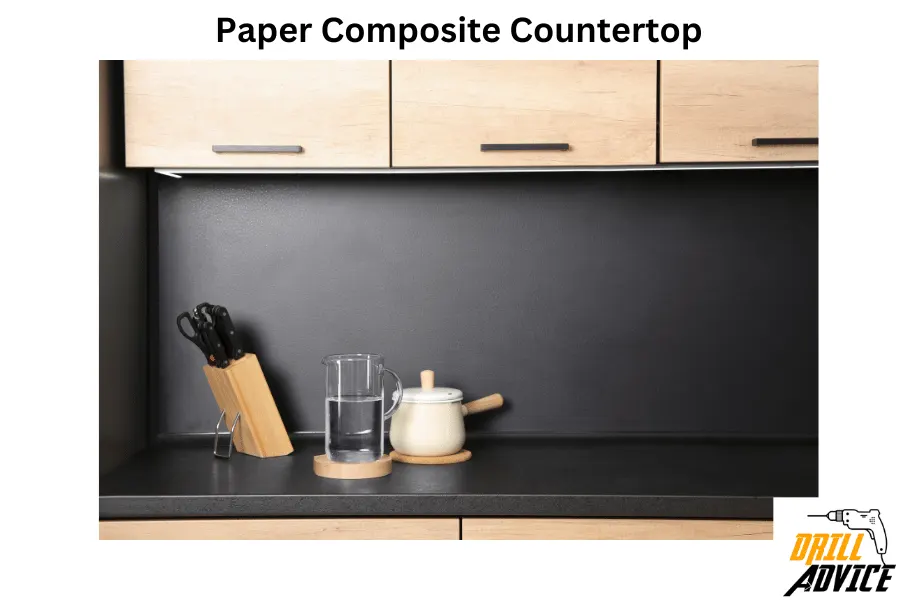
- Budget: Paper composite panels are generally considered a mid-range to higher-end option in terms of cost. While they may be more expensive compared to some other materials, they offer unique properties and a sustainable choice for countertops.
- Water Resistance: Paper composite panels are highly water-resistant, making them suitable for use in kitchens. The combination of paper fibers and resins creates a dense and durable surface that repels water. However, it is still recommended to wipe up any spills promptly to avoid potential staining or damage.
- Heat Resistance: Paper composite panels have good heat resistance, but it is still advisable to use trivets or hot pads to protect the surface from direct heat exposure. While they can withstand moderate heat, prolonged exposure to high temperatures can cause damage, such as discoloration or warping.
- Scratch Resistance: Paper composite panels are generally scratch-resistant and durable. The solid surface is less prone to scratches compared to some other materials. However, it is still important to use cutting boards and avoid dragging sharp objects across the surface to prevent any potential scratching or damage.
- Maintenance, Cleaning, and Repair: Paper composite panels are relatively low-maintenance. They are easy to clean with a mild soap and water solution or a non-abrasive cleaner. Avoid using harsh chemicals or abrasive cleaners that can damage the surface. In terms of repair, minor scratches or chips can often be repaired using sanding or buffing techniques.
- Aesthetic View: Paper composite panels offer a unique and eco-friendly look to your kitchen. They have a warm and natural appearance, with visible paper fibers adding a touch of texture and character. Paper composite panels are available in various colors and finishes, allowing you to find a style that suits your kitchen design.
14. Resin Countertop
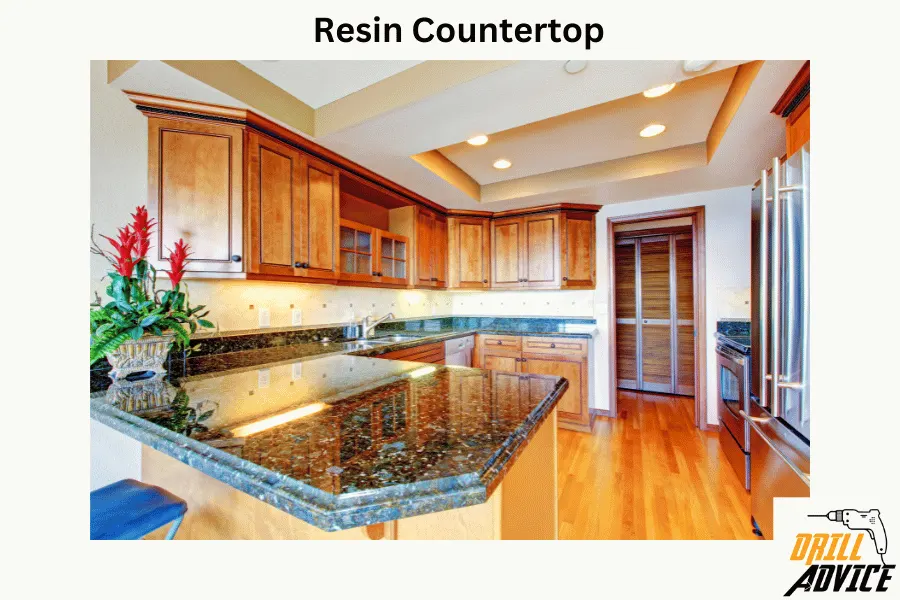
- Budget: Resin countertops can vary in price, but they are generally considered a higher-end option. They often fall into the luxury countertop category due to their unique properties and aesthetics.
- Water Resistance: Resin countertops are highly water-resistant. The non-porous nature of resin prevents water absorption, making it suitable for kitchen use. This property helps to protect against water damage and staining. However, it’s still important to promptly wipe up any spills to avoid potential staining or discoloration.
- Heat Resistance: Resin countertops have good heat resistance. They can withstand normal kitchen temperatures without significant damage. However, it’s advisable to use trivets or hot pads to protect the surface from direct heat exposure to avoid potential issues like discoloration or warping.
- Scratch Resistance: Resin countertops are generally scratch-resistant. The solid surface of resin is durable and less prone to scratches compared to some other materials. However, it’s still recommended to use cutting boards and avoid dragging sharp objects across the surface to maintain its pristine condition.
- Maintenance, Cleaning, and Repair: Resin countertops are relatively low-maintenance. They are easy to clean with a mild soap and water solution or a non-abrasive cleaner. Avoid using harsh chemicals or abrasive cleaners that can damage the surface. In terms of repair, minor scratches or chips can often be repaired using specialized resin repair kits.
- Aesthetic View: Resin countertops offer a unique and contemporary look to your kitchen. They have a sleek and glossy appearance that can enhance the overall design of your space. Resin countertops are available in a wide range of colors, patterns, and finishes, allowing for customization to suit your style and preferences.
15. Concrete Countertop
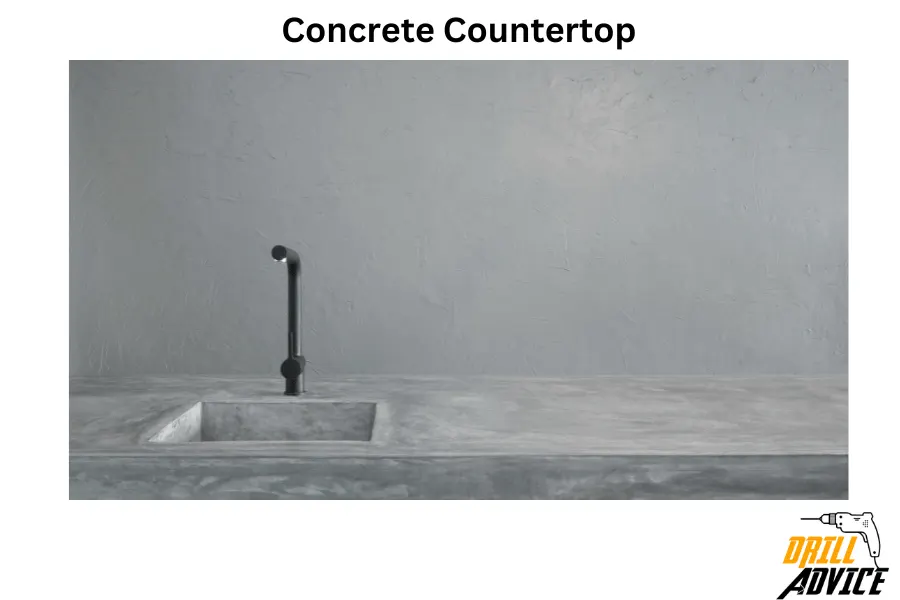
- Budget: Concrete countertops can vary in price, but they are generally considered a mid to higher-end option. The cost can depend on factors such as the complexity of the design, customization, and the type of finish you choose.
- Water Resistance: Concrete countertops can be made water-resistant through the use of sealers and proper maintenance. A high-quality sealer helps to protect the concrete from water absorption, preventing potential damage or staining. It is important to regularly reapply sealers as per manufacturer recommendations.
- Heat Resistance: Concrete countertops have good heat resistance. They can withstand high temperatures without significant damage. However, it is still advisable to use trivets or hot pads to protect the surface from direct heat exposure for prolonged periods, as extreme heat can potentially weaken or discolor the sealer.
- Scratch Resistance: Concrete countertops are generally durable and scratch-resistant. However, they can be susceptible to minor scratches or dings. It is recommended to use cutting boards and avoid dragging sharp or abrasive objects across the surface to minimize the risk of scratches or damage.
- Maintenance, Cleaning, and Repair: Concrete countertops require regular maintenance to keep them in good condition. This includes resealing as needed and cleaning with a mild soap and water solution or a pH-neutral cleaner. Avoid using abrasive cleaners or harsh chemicals that can damage the sealer. In terms of repair, minor scratches or chips can often be repaired using specialized concrete repair kits.
- Aesthetic View: Concrete countertops offer a unique and customizable look to your kitchen. They can be molded, shaped, and customized to fit your specific design preferences. Concrete provides a modern and industrial aesthetic, with options for different finishes such as polished, honed, or textured surfaces. The versatility of concrete allows for various color pigments, aggregates, and decorative elements to be incorporated.
16. Cement Countertop
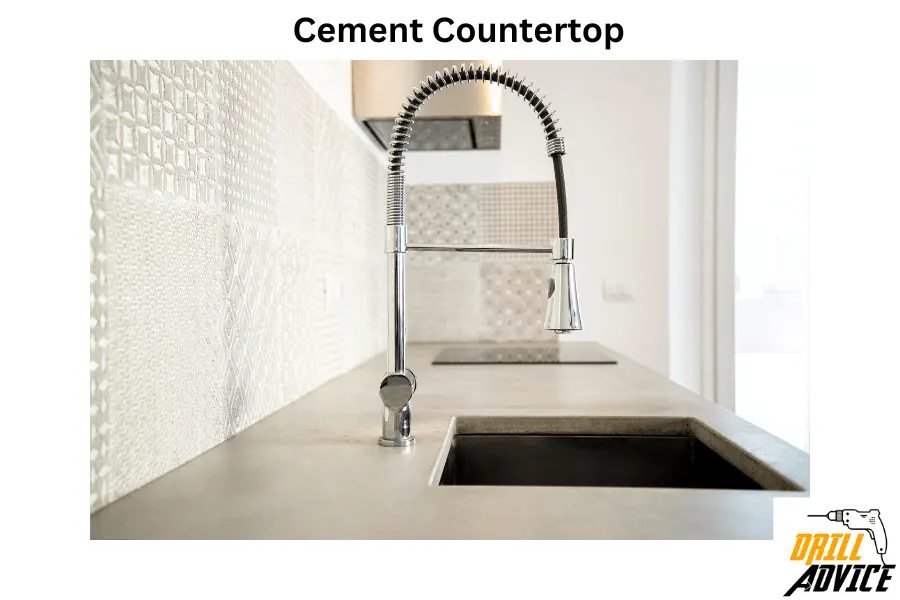
- Budget: Cement countertops are generally considered a mid-range to higher-end option. The cost can vary depending on factors such as the complexity of the design, customization, and the type of finish you choose. It’s important to factor in the additional costs of installation and sealing.
- Water Resistance: Cement countertops are not naturally water-resistant. However, they can be made water-resistant through the use of sealers and proper maintenance. A high-quality sealer helps to protect the cement from water absorption, preventing potential damage or staining. It is important to regularly reapply sealers as per manufacturer recommendations.
- Heat Resistance: Cement countertops have good heat resistance. They can withstand high temperatures without significant damage. However, it is still advisable to use trivets or hot pads to protect the surface from direct heat exposure for prolonged periods, as extreme heat can potentially weaken or discolor the sealer.
- Scratch Resistance: Cement countertops are generally durable and scratch-resistant. However, they can be susceptible to minor scratches or dings. It is recommended to use cutting boards and avoid dragging sharp or abrasive objects across the surface to minimize the risk of scratches or damage.
- Maintenance, Cleaning, and Repair: Cement countertops require regular maintenance to keep them in good condition. This includes resealing as needed and cleaning with a mild soap and water solution or a pH-neutral cleaner. Avoid using abrasive cleaners or harsh chemicals that can damage the sealer. In terms of repair, minor scratches or chips can often be repaired using specialized cement repair kits.
- Aesthetic View: Cement countertops offer a unique and versatile look to your kitchen. They can be molded, shaped, and customized to fit your specific design preferences. Cement provides a modern and industrial aesthetic, with options for different finishes such as polished, honed, or textured surfaces. The versatility of cement allows for various color pigments and decorative elements to be incorporated.
17. Soapstone Countertop
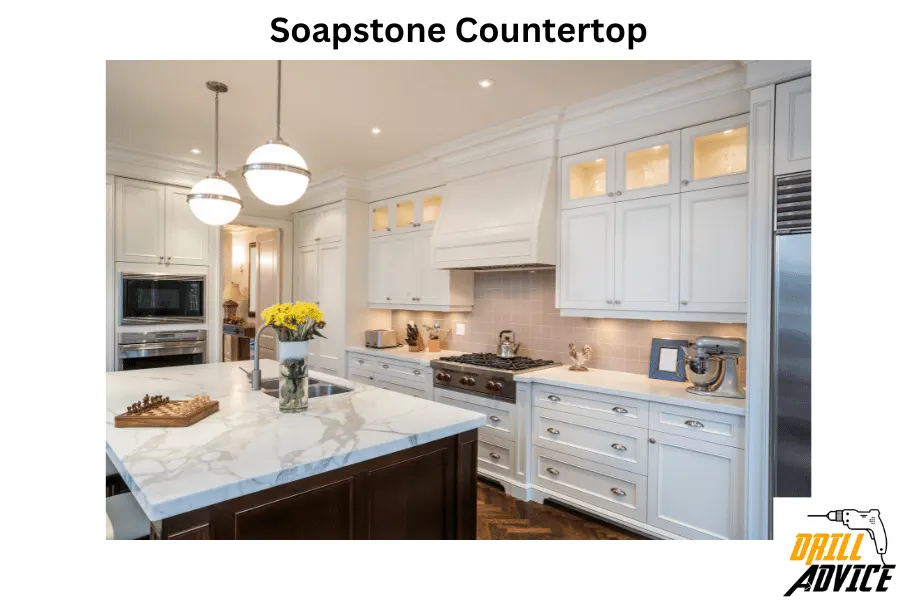
- Budget: Soapstone countertops are generally considered a mid to higher-end option. They can be more expensive compared to materials like laminate or tile, but they offer unique properties and a natural beauty.
- Water Resistance: Soapstone is naturally resistant to water, making it an excellent choice for kitchen countertops. It is non-porous and does not absorb moisture, which helps prevent water damage or staining. However, it’s still important to wipe up any spills promptly to avoid potential staining or discoloration.
- Heat Resistance: Soapstone is highly heat resistant, making it ideal for kitchen countertops. It can withstand high temperatures without significant damage. This means you can place hot pots and pans directly on the surface without worrying about causing any damage.
- Scratch Resistance: Soapstone is a durable material that is known for its scratch resistance. While it is not completely scratch-proof, it can withstand normal kitchen use without significant damage. However, it’s still advisable to use cutting boards and avoid dragging sharp objects across the surface to maintain its pristine condition.
- Maintenance, Cleaning, and Repair: Soapstone countertops require minimal maintenance. They do not require sealing like some other natural stone materials. Cleaning can be done with a mild soap and water solution or a non-abrasive cleaner. In terms of repair, minor scratches or chips can often be sanded out or oiled to restore the surface.
- Aesthetic View: Soapstone countertops offer a unique and natural look to your kitchen. They have a timeless and elegant appearance, with a smooth, matte finish. Soapstone comes in various shades of gray, ranging from light to dark, and may develop a natural patina over time, adding character to the surface.
18. Glass Countertop
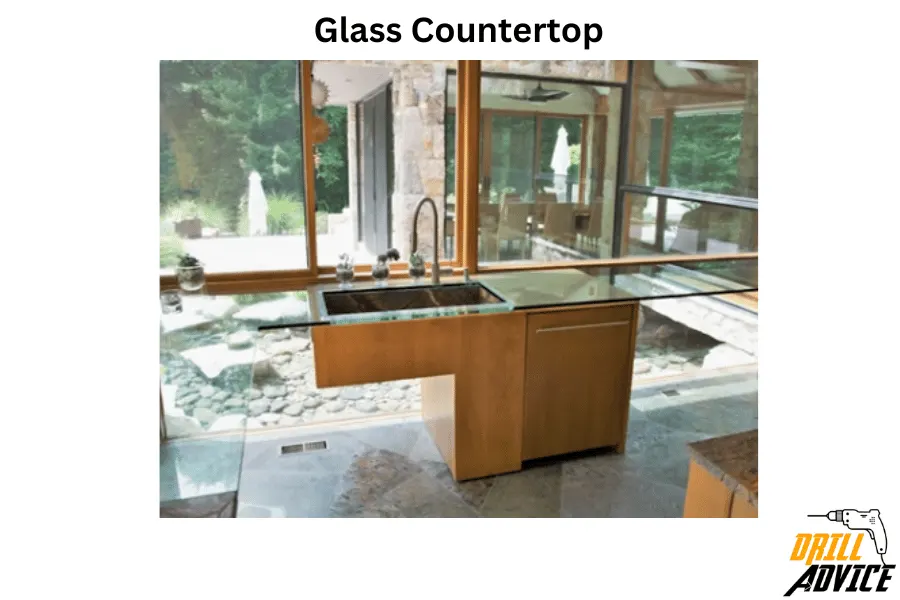
- Budget: Glass countertops can vary in price, but they are generally considered a higher-end option. The cost can depend on factors such as the type of glass, thickness, and customization. It’s important to consider your budget and the unique properties of glass before making a decision.
- Water Resistance: Glass countertops are highly water-resistant. Glass is non-porous and does not absorb moisture, making it suitable for kitchen use. It is easy to clean and does not require sealing. However, it’s important to promptly wipe up any spills to avoid potential staining or water spots.
- Heat Resistance: Glass countertops have good heat resistance. They can withstand normal kitchen temperatures without significant damage. However, it is still advisable to use trivets or hot pads to protect the surface from direct heat exposure to prevent any potential issues such as thermal shock or cracking.
- Scratch Resistance: Glass countertops are generally scratch-resistant. The surface of glass is durable and less prone to scratches compared to some other materials. However, it’s still recommended to use cutting boards and avoid dragging sharp or abrasive objects across the surface to maintain its pristine condition.
- Maintenance, Cleaning, and Repair: Glass countertops are relatively low-maintenance. They are easy to clean with a mild soap and water solution or a glass cleaner. Avoid using abrasive cleaners or harsh chemicals that can damage the surface. In terms of repair, minor scratches or chips can often be repaired using specialized glass repair kits.
- Aesthetic View: Glass countertops offer a sleek and modern look to your kitchen. They provide a reflective and translucent appearance that can enhance the overall design of your space. Glass countertops are available in various colors, patterns, and textures, allowing for customization to suit your style and preferences.
